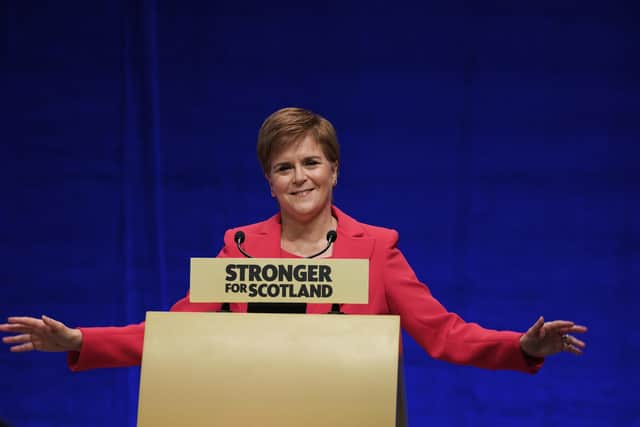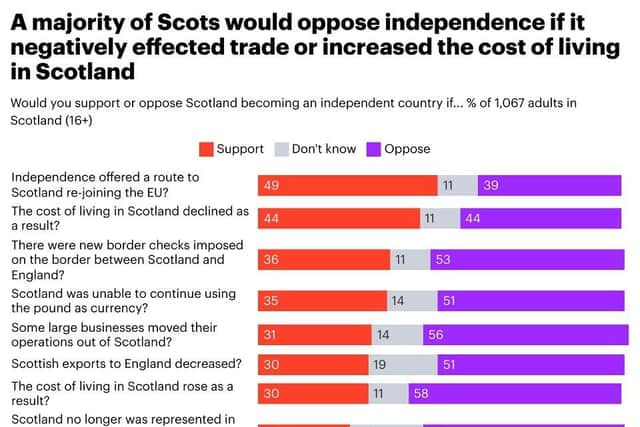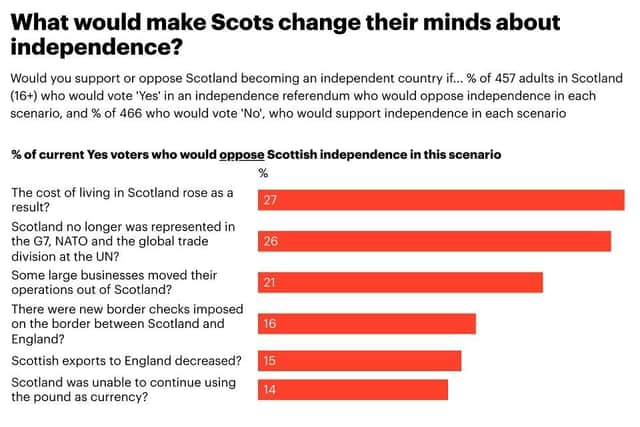Scottish independence: Fears of an increased cost-of-living would put off pro-indy voters, poll suggests
This article contains affiliate links. We may earn a small commission on items purchased through this article, but that does not affect our editorial judgement.
On the week the Scottish Government published its renewed economic case for independence, the findings demonstrate the potential pitfalls for the pro-independence side ahead of a campaign.
The poll, undertaken by YouGov, interviewed 1,067 Scottish adults aged 16 and over between September 30 to October 4. They were asked about several potential scenarios which could change their mind on independence.
Advertisement
Hide AdAdvertisement
Hide AdConcerns around the cost of living topped the list for prospective Yes voters.
More than a quarter of Yes voters (27 per cent) said they would oppose independence if the cost of living rose as a result, with 11 per cent of No voters saying they would back independence should it result in a decrease in the cost of living.
Scotland losing its place on the biggest diplomatic tables is also viewed negatively by Yes voters. A total of 26 per cent said Scotland losing its representation in the G7, NATO, and the global trade division of the United Nations would see them oppose independence.
Fears of large businesses leaving Scotland (21 per cent) and a drop in Scottish exports to England (15 per cent) would also see shifts to opposing independence.
Border checks between England and Scotland, confirmed as required in the Scottish Government’s most recent paper setting out the case for independence, would see 16 per cent of Yes voters oppose independence, according to the poll.


Despite concerns over the future of the Scottish currency pre-2014 being attributed as one of the central reasons behind the Yes campaign’s defeat in the 2014 referendum, the issue is the least likely cited in the poll to see voters shift to No.
Just 14 per cent of Yes voters said they would oppose Scottish independence if Scotland was unable to continue using the pound as currency.
Nicola Sturgeon confirmed the SNP’s plan was for Scotland to continue to use the pound following independence for an indefinite period before moving to a separate currency.
Advertisement
Hide AdAdvertisement
Hide AdHowever, she refused to set out when this might happen or under what criteria.


The figures also demonstrate the strengths and weaknesses of various promises and warnings from both sides of the campaign.
Scottish nationalists began using the phrase ‘Project Fear’ to describe the unionist campaign after it was used by one of the key figures in the Better Together campaign, with many of the scenarios polled on used by both sides of the debate.
Re-joining the EU is viewed as the most likely reason for people switching from No to Yes, with 14 per cent of No voters stating they would back independence if an independent Scotland re-joined the political and economic union.
However, asked whether they would support or oppose independence, it was the only scenario that saw more people backing independence than opposing it, with the prospect of a decline in the cost-of-living making 44 per cent of Scots support and oppose independence.


The cost of living increasing due to independence despite already being under significant pressure due to energy prices and inflation would result in 58 per cent opposing independence and 30 per cent supporting independence.
Within the same poll, support for independence remains stagnant at close to a 50/50 split, with 51 per cent stating they would vote No at an independence referendum with 49 per cent backing Yes.
With don’t knows included (11 per cent), Yes support drops to 38 per cent with No at 46 per cent.
All episodes of the brand new limited series podcast, How to be an independent country: Scotland’s Choices, are out now.
It is available wherever you get your podcasts, including Apple Podcasts and Spotify.
Comments
Want to join the conversation? Please or to comment on this article.
